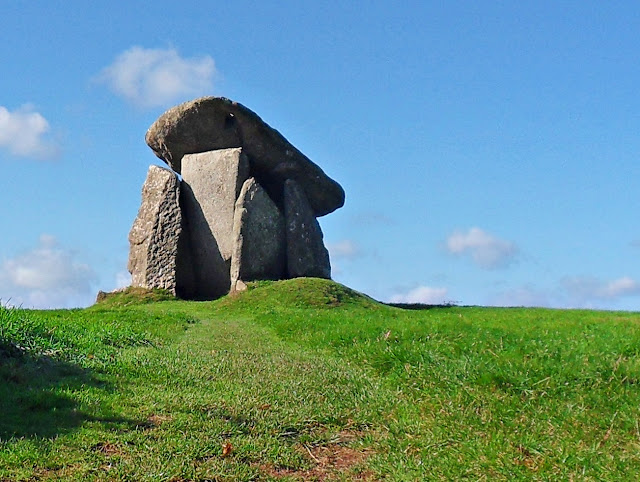Monuments like the Trevethy Quoit raise so many questions. They are quite mind blowing as some 'experts' say that were constructed around 3500 BC. But there again, I read one report where the conclusion was that they could be from 6000 BC - not sure of that, but they must be at least 5000 years old - so they are on a par with the much more famous Stonehenge.
Then there is question as to how the people, of that time, moved the seven stones that make up the quoit. The capstone is reckoned to weigh something like 10.5 tons.
And so the questions go on. If we look at the photo below it can be seen that there is a hole in the capstone. Why?
Again opinions are split. The hole could perhaps be for astrological reasons. Maybe the hole was added later. It is said that in the 1600s the local people used this to hold a flagpole.
Okay lets look at some of the possibilities as to the purpose of the Quoit.
(a) To hold the bones of the dead.
(b) To mark communal territory.
(c) As a gathering place.
(d) For ritual and ceremonial life for the local community.
All well and good but lets have a closer look at different parts of the Trevethy Quoit. The photos above are all from the east side of the monument.
In the photo below it can be seen that at the bottom of the large upright stone, to the right hand side, there is an opening which may have been used as access to the inner part of the quoit.
The next photo shows the south side of the monument. As can be seen the large stone to the west side, in shadow, has unfortunately, collapsed. This seemingly happened in 1850.
Looking at the western collapsed stone it can be seen that there are several small holes or indentations in the stone. There is a story as to what these are. They are Midsummer Merriment Holes.
The story is that a young man, of the middle ages, would have filled such a hole with a small explosive. He would then have lit this to proclaim his love for a sweetheart - ahhhh!
Going back to the Trevethy Quoit, as a whole, it is is mostly thought that this was a burial chamber, It would have been partly covered with soil and stones so, from a distance, it would appear to be a natural mound in the landscape. It isn't believed though that it would have been completely covered.
If the monument was erected around 3500BC this would be during the Neolithic period. At this time there were known to be people living in the area. It was a time when there would have been some of the first farmers. In fact the Parish of St Cleer, which encompasses Trevethy Quoit, is believed to have been inhabited from 6000 BC.
Of course there are still many unanswered questions about this and other such quoits. To finish though here are a few random photos of the monument.
I wonder what you think their purpose was, when they were built all of those thousands of years ago.
Similar Posts:
(1) The Mysterious Roche Rock, Cornwall
(2) The Mystery of the Three Hurlers Stone Circles on Bodmin Moor
(3) The Ancient Stone, Over 1100 Years Old, known as Doniert's Stone












This is an interesting structure with lots of history.
ReplyDelete